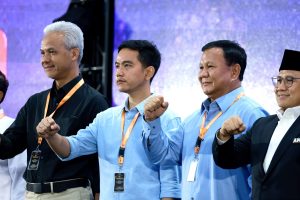Campaigning has officially begun for Indonesia’s presidential election, with two of the three candidates launching national campaign tours that will see them criss-cross the archipelago during the 75-day campaign period.
Yesterday’s campaign launches initiate a downhill run until polling day on February 14, when up to 204 million people will be eligible to cast a vote in presidential, parliamentary, and regional elections.
Most international attention will be on the presidential contest, a three-way contest to succeed President Joko “Jokowi” Widodo as the leader of the world’s third-largest democracy. Making his third run at the presidency, Defense Minister Prabowo Subianto is going head-to-head with Ganjar Pranowo, the former governor of Central Java province, and former Jakarta Governor Anies Baswedan.
As Reuters reported, Ganjar, the candidate of the ruling Indonesian Democratic Party of Struggle (PDI-P), began his campaign in the easternmost South Papua province, having lunch with residents in the town of Merauke, pledging to “start our fight to provide prosperity for all Indonesians.” His running-mate Mahfud MD started campaigning on the opposite end of the archipelago, in conservative Aceh on the western tip of Sumatra.
Meanwhile, Anies launched his national campaign in the densely populated vote-bank of Java, visiting homes in North Jakarta, while his running-mate Muhaimin Iskandar campaigned in Mojokerto, a city in East Java province. Representatives of Prabowo’s campaign said that he and his running-mate, Gibran Rakabuming Raka, the eldest son of Jokowi, will begin their campaigning later this week.
Most of this year’s opinion polls have shown Prabowo and Ganjar in a close race, with Anies lagging a distant third. However, in the latest batch of opinion polls, Prabowo, who was defeated by Jokowi in both the 2014 and 2019 presidential elections, had seemingly opened up a significant lead over Ganjar.
Indikator Politik Indonesia (IPI) reported earlier this month that Prabowo was the preferred selection of 40.6 percent of respondents, compared to 27.8 percent for Ganjar, with Anies Baswedan coming a distant third with 23.7 percent. Another survey by Poltracking Indonesia showed Prabowo sitting on 41.7 percent support, compared to 31 percent for Ganjar and 25.7 percent for Anies.
This suggests that the former general has enjoyed the benefits of what has been described as an “adorable” social media campaign designed to win over young voters. Of the 204 million eligible voters, 106 million, or around 52 percent of the total, are people younger than 40. Nearly a quarter belong to Generation Z, born from the late 1990s onward.
This may also reflect the impact of the announcement of 36-year-old Gibran as his vice-presidential running-mate. Gibran’s candidacy, an attempt by Prabowo’s campaign to tap into Jokowi’s continuing sky-high popularity and court the youth vote into the bargain, has been the subject of considerable controversy over the past month. Gibran was only able to put forward his candidacy after a Constitutional Court ruling in mid-October that created an exception to the minimum age requirement of 40, allowing candidates who have served in elected office at the regional level to run as presidential and vice-presidential candidates. Gibran has served as mayor of Surakarta, a post once occupied by his father, since 2021.
The entrance of Jokowi’s son into the electoral fray has created a tantalizing subplot to the election, reflecting an apparent rift between the outgoing president and the PDI-P, the party that backed his presidential runs in 2014 and 2019. Many have viewed the move as an indirect endorsement by Jokowi of the Prabowo-Gibran ticket, and a bid to maintain power through his son. This has prompted election monitors and civil society groups, as well as Ganjar and Anies themselves, to call on Jokowi to maintain his neutrality as the election unfolds.
However, the campaign period is long and there is a lot of twists that can take place between now and February 14, as Arya Fernandes, a political analyst from the Center for Strategic and International Studies Indonesia, told The Associated Press. “With a swing voter is still around 30 percent, our electorate is still susceptible to change and dynamic due to several conditions,” Fernandes said.
Time will tell whether Prabowo’s gambit, and Jokowi’s possible attempt to extend his power beyond his time in office, will be successful – but it is clear that there is a lot riding on it for both leaders.

































